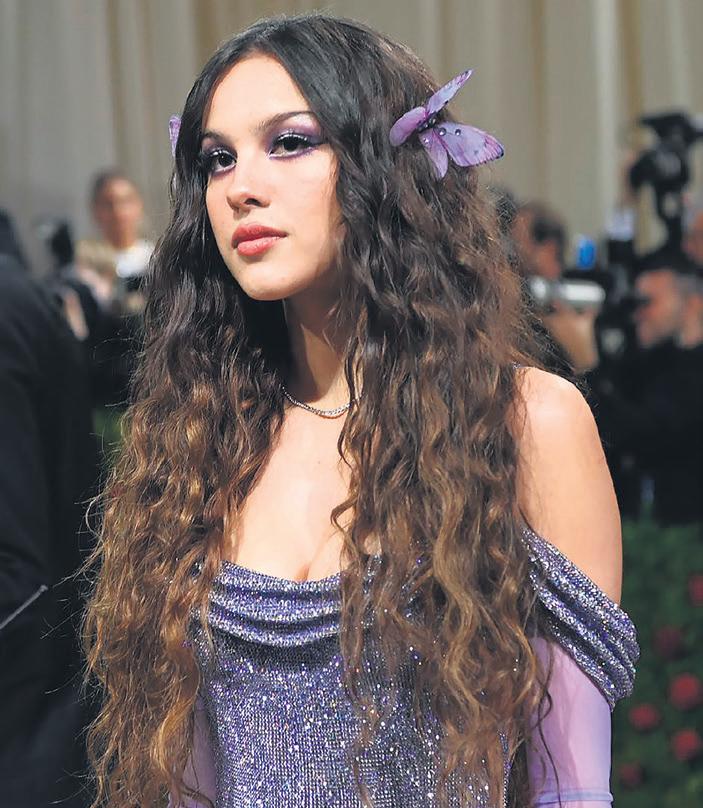
2 minute read
Olivia Rodrigo’s ‘Vampire’ takes a note from Taylor Swift: Leave a mark
By JON CARAMANICA
On “Drivers License,” one of the great singles of the 2020s, Olivia Rodrigo has been played for a fool by an ex, but the song — pulsing, parched, destitute — remains centered in her pathos. She may have been abandoned, but the person who did the damage is still an object of, if not exactly affection, then obsession: “I still hear your voice in the traffic/ We’re laughing/ Over all the noise.” At the song’s conclusion, she is alone, and lonely.
Advertisement
That was the Rodrigo from 2 1/2 years ago, when she was reintroducing herself to the world as a human after a stretch as a Disney actress automaton. The Rodrigo who appears on “Vampire,” the first single from her forthcoming second album, has now lived through some things. Her sweetness has curdled.
“Vampire” is nervy and anxious, a tripartite study in defiance that begins with Elton John-esque piano balladry a la “Drivers License” — a head fake in the direction of naiveté.
But Rodrigo knows better now, or at least knows more: Rapid stardom has both bolstered and cloistered her. “I loved you truly,” she sings, deadpan, then almost cackles the next line, “You gotta laugh at the stupidity.” The song continues in this vein, through a boisterous up-tempo midsection and a rowdy, theatrical conclusion. Her subject matter — romantic disappointment, being left in the lurch — is the same, but the stakes are much greater now.
“I used to think I was smart/ But you made me look so naive,” she sings. It is the sort of insider-outsider awareness that can only come from being both the object and the subject at once — powerful enough to author your own story, vulnerable enough to fall prey to someone else’s wiles.
It is, in short, Rodrigo’s “Dear John.”
Over a decade after its release, “Dear John” remains one of the most powerful songs in Taylor Swift’s catalog, and also among the most idiosyncratic. Purportedly about a dismal romantic engagement with John Mayer, it is produced in the style of Mayer, dressed liberally with blues guitar noodling.
Lyrically, it’s not only astute, it’s vicious. Swift begins with a similar unjaundiced shrug — “Well, maybe it’s me/ And my blind optimism to blame” — then goes on to surgically, savagely disassemble her foe: “You are an expert at sorry and keeping lines blurry/ Never impressed by me acing your tests.”
“Dear John” appeared on “Speak Now,” Swift’s third album, released when she was 20. It wasn’t a single, but it was one of a pair of songs on the album — the other was “Mean,” about a fierce critic of her artistry — in which Swift began cre-
Olivia Rodrigo at the Metropolitan Museum of Art’s Costume Institute benefit gala in New York, May 2, 2022. The pop singer’s new single dismantles a former paramour who was entranced by fame, borrowing a tactic from Taylor Swift’s career-shifting
“Dear John.” atively and publicly reckoning with the public version of herself. Her earlier songwriting felt winningly insular, almost provocatively emotionally intimate. But “Dear John” announced Swift as a bolder and riskier performer and songwriter, one unafraid of using stardom as her ink, and who understood that the celebrity most people knew provided as much fodder as her inner life.
Rodrigo is 20 now, and “Guts,” due in September, will be her second album. And while “Drivers License” and its fallout became tabloid fodder, the public narrative wasn’t encoded into the song itself.
“Vampire” changes that. Rodrigo’s target here is someone attempting to be glamorous, or perhaps glamour itself: “Look at you, cool guy, you got it/ I see the parties and the diamonds sometimes when I close my eyes/ Six months of torture you sold as some forbidden paradise.”
The relationship itself, Rodrigo learns, is a transaction,










